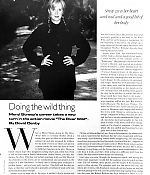|
Simply Streep is your premiere source on Meryl Streep's work on film, television and in the theatre - a career that has won her the praise to be one of the world's greatest working actresses. Created in 1999, we have built an extensive collection to discover Miss Streep's body of work through articles, photos and videos. Enjoy your stay.
|
Celebrating
25 years
of SimplyStreep
|
|
Doing the wild thing
Vogue ·
January 1995
· Written by David Denby
|
What is Meryl Streep doing in The River Wild? Here is a routine thriller about a family that goes out West on a white-water rafting trip and gets menaced by robbers. It’s the kind of movie in which each person is given exactly the trait they need in order to fulfil their function in the plot. There is a family dog (a dog? On a dangerous ratting trip?) and a little boy. Even you’ve never seen a family white-water thriller before, you may feel during The River Wild that you’ve been watching it all your life. Most of the elements in the movie are as standardised and calculated as the sign of a new hatchback. A family that is falling apart undergoes a terrible threat – and everyone pulls together. The child and the dog are there so that they can be placed in jeopardy; a husband is weak so he can demonstrate hidden strength.
Streep, as we’ve been told by the press, is unable to find a serious role and is appearing in this obviously commercial, instant-genre movie as a way of re-establishing her bankability. My feeling is that the movie is worthy of her, yet there’s no reason to grieve: Meryl Streep emerges with her honour intact. She gives her heart and soul and a good bit of her body to The River Wild, and her performance is fascinating. At the beginning of the movie, she pumps up a large rubber raft for the family adventure, and throughout The River Wild she’s the only thing keeping the picture afloat.
Streep plays Gail, the adventure-loving mother. Gail is a former daredevil river guide -a rafter known, in her reckless youth, as “Whitewater”. But years ago, she left the West, moved to Boston, and married an architect (David Strathairn), a rather sheepish man who feels he can’t live up to her. There’s a suggestion of sexual disappointment in the union, an absence: nothing is going on in that marriage like those early churning rides over the rapids. Gail is hungry for the outdoors, for excitement and danger. Streep has developed some muscle in her upper arms, and she looks comfortable and even commanding as she stands on the raft, leaning back and pulling hard against the river. In the old days, of course, this sort of thing would have been faked in the studio -the star would have rowed in a water tank as the wind machine ruffled her hair. But director Curtis Hanson (The Bedroom Window, The Hand that Rocks the Cradle) took his crew and actors to Montana and Oregon and worked the rivers wild. Streep is convincing as an abrupt, competitive woman. Her eyes are alive, and she has a strong contemptuous laugh. In all, she shows more personality in this role than in some of her more controlled outings (such as The French Lieutenant’s Woman, in which she was skilled and haunting but not quite there in this vibrant way).
Flirting with Kevin Bacon’s sexy thug in the beginning, she seems ready for action. Gail loves her husband, but she’s also exasperated with him, and Streep – eyes flickering, sudden smiles disappearing, sour and happy moods moving across her face like patchy cloud in a blue sky -suggests an ambivalence in Gail only just under control. Meryl Streep returns acting to its old, Garboesque field of combat and desire: the face. She is always thinking, trying things out; she brings almost more consciousness to the role than it needs, and she’s often acting on a different level from the others. But that consciousness keeps one interested.
Gail takes everyone through the dangerous rapids, and during the white-water sequences I could feel the audience press forwards in their seats. The raft tumbles, spins, pitches, and the beauty of the tumultuous water is often stirring. The episodes hold you, but when they end, the idiotic plot returns, with Strathairn repeatedly getting beaten up, and the little kid getting in the way, and the goddamned dog leaping from a ledge into the water like Robert Redford and Paul Newman in Butch Cassidy and the Sundance Kid. And when the movie is over, it’s over; nothing remains but the memory of Meryl Streep thinking and acting all the time, and looking around for a movie to fit herself into.










